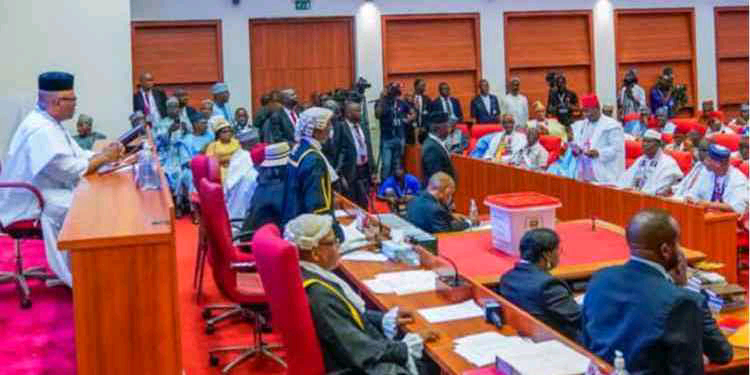Humanitarian Ministry: Senate plans return of NSIPA to Presidency

The National Social Investment Programme Agency Act (NSIPA), 2023, was amended by the Senate on Tuesday with the goal of shifting the agency from the Ministry of Humanitarian Affairs and Poverty Alleviation to the Presidency.
During Tuesday’s plenary, Senate Leader Opeyemi Bamidele introduced a measure to alter the National Social Investment Programme Agency Act, 2023.
Bamidele said that by moving the agency from the Ministry of Humanitarian Affairs and Poverty Alleviation to the Presidency, the bill specifically aims to alter Sections 9(3), 14(1), 21(1), 22(1), 26(1), and 33 of the NSIPA Act, 2023.
The Senate leader continued, saying the law “will now be directly under the direct supervision of the President.”
The amendment to the NSIPA Act, 2023, he continued, “is to ensure that the social investment programme are standard, transparent, effective and accountable.” He went on to further discuss its significance for reducing poverty and promoting social inclusion.
According to him, the amendment “is a result of President Bola Tinubu’s commitment to the Renewed Hope mantra in ensuring that social investment programs are standard, transparent, effective, and accountable structure of delivery, adequate coordination, and synergy among key government agencies.”
The change “is in fulfillment of section 17(3) of the Constitution of the Federal Republic of Nigeria, 1999,” the senate leader observed.
According to the provision, the state must focus its policies on guaranteeing that all citizens, without any form of discrimination against any group, have access to appropriate means of subsistence and possibilities to find acceptable employment, among other things.
Bamidele stated that the NSIPA may achieve a number of Sustainable Development Goals (SDGs) with this amendment, including poverty reduction, education, health, social inclusion, and empowerment.
The bill was enacted by the 9th Senate, however Ahmed Lawan, the previous president of the Senate, noted during the plenary that its execution was defective because individuals who needed support were in hard-to-reach rural areas.
Lawan, who is currently Yobe North’s representative, said: “Funds were dispersed to achieve social inclusion, but the beneficiaries have no bank accounts. After this has been passed, it is time for us to fully participate to guarantee that the beneficiaries who require support are identified in a way that the National Assembly is happy.
The National Assembly “should have been to be part of the process, but that was not done,” he continued. Each federation state received the assistance. It is intolerable that every senator was just a bystander.
Senator Seriake Dickson, who participated in the discussion, asked the lawmakers to take advantage of the chance to examine other problems brought up during the law’s execution under the administration of the late President Muhammadu Buhari.
The method of choosing the program’s recipients should be included in the revision, according to Dickson, who is presently the representative for Bayelsa.
He asserted that proposals had to be made at the committee level and that the previous administration carried out programs like TraderMoni and COVID palliatives without receiving parliamentary permission.
The Senate President swiftly forwarded the bill to the committee of the whole for consideration on Wednesday after the discussion so that eminent senators could review it clause by clause.
While the NSIPA Act was passed in May 2023 to address socioeconomic disparities and reduce poverty among Nigerians, NSIP was established in 2016 while President Muhammadu Buhari was still in office.
The N-POWER Program, Government Enterprise and Empowerment Programme, National Home-Grown School Feeding Programme, and Conditional Cash Transfer Programme were the four foundations upon which the program was built.
Regardless of where they were located around the country, each pillar was created to enable the most vulnerable and impoverished Nigerians to achieve a decent quality of living.
